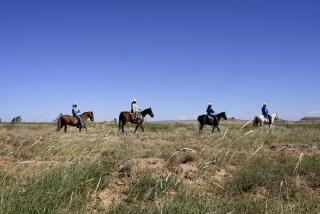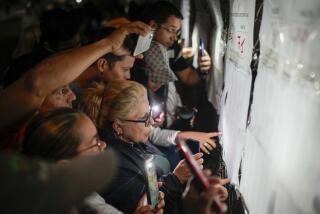Fear has a vote as well
- Share via
HARARE, ZIMBABWE — James Moyo’s eyes blinked open at 5 a.m. Friday, an election day that promised despair.
Moyo felt profound gloom, yet he could not let go of a thread of hope that maybe Zimbabwe would be brave enough to vote against President Robert Mugabe.
“I was thinking, ‘Today, I am going to vote. But, yes! I am going to vote for the party of my choice!’ ” Moyo said, noting that opposition candidate Morgan Tsvangirai remained on the ballot though he had withdrawn this week from the presidential runoff. “ ‘I can choose him.’ ”
But Moyo was among many Zimbabweans who said they had faced intimidation before and during the one-candidate runoff election Friday by roaming groups of government supporters who threatened people into voting as a way to ensure a Mugabe victory. The situation was condemned by representatives of numerous nations, including the United States.
“What is going on in Zimbabwe is simply unacceptable in the 21st century and cannot be ignored by the international community,” said U.S. Secretary of State Condoleezza Rice.
Observers at various polling stations said voter turnout was low. Results were expected late Saturday.
Much of Zimbabwe’s population is fed up with the country’s economic collapse, hyperinflation and 80% unemployment, as well as the Mugabe government’s strong-arm tactics.
A sweeping mood for change saw Mugabe’s ruling ZANU-PF lose its parliamentary majority for the first time in March 29 elections, and Tsvangirai best Mugabe in the presidential race then, with about 48% of the vote compared with about 43%, according to official figures.
Then Zimbabwe’s military and security chiefs and liberation war veterans took over ZANU-PF’s campaign to turn around the shocking defeat: A network of 900 command bases was set up across the country, mobilizing ZANU-PF youth militias to attack and beat opposition activists, drive them from their homes, burn their houses and rape women. People were forced to attend “re-education” meetings, and threatened that if they did not vote for Mugabe in the runoff they would be killed, according to people who had to go to the meetings.
Moyo insisted on voting Friday. His wife shrugged at the pointlessness, since the 84-year-old Mugabe, who has ruled Zimbabwe since its independence in 1980, had made it clear that he would not give up power.
The Moyos were the first to get to the polling station in the crowded neighborhood of Mbare. Almost two hours passed before the polling station opened, at 7 a.m. Few people had arrived.
Gone was the expectant hubbub that had greeted him when he rose before dawn to vote in March. “Last time there were so many people,” he said. “But this time, there were few people.”
Moyo’s hope of voting freely was dashed Friday when ZANU-PF agents at the polling booth demanded his name, ID number and address and wrote them down. Then they ordered him to provide the serial number on his ballot paper after voting. With threats of retribution for voting the wrong way, he knew his ballot would not be secret.
“We wanted things to change. But now the situation today is different,” he said. “We are afraid. Maybe they can come to my home. I don’t know what will happen to me.” He looked away, evading eyes.
Tsvangirai pulled out of the runoff because of the violence against his Movement for Democratic Change, which with another faction won the most seats in parliament. Recent attacks by government supporters have killed 85 opposition activists and supporters and injured about 3,000.
Forced to vote, many Zimbabweans in ballot booths across the country agonized over what to do. Many voters felt they had a choice between the man they wanted but were afraid to vote for, and the man they were afraid of and felt they had to vote for.
Moyo stood in the ballot booth Friday, clenched with fear. Mugabe or Tsvangirai? He hesitated, thinking of the consequences, then marked his ballot.
“I just want change. I voted for Tsvangirai, whether they like it or not. I’m not afraid to die today. But a lot of people do not have that courage.” Then he went and gave the ruling party agents his serial number.
For Brian Mwale, who was certain he could sniff change in the air when he voted in March and that Mugabe would lose, Friday felt different.
This time he woke at 8 a.m. and felt nothing. Who cared whether other people were going to vote? He wouldn’t waste his time.
However, he changed his mind after a tip-off from a friend who is forced to patrol with ZANU-PF youth militias, warning that they were planning a door-to-door crackdown to make sure people had indelible ink on their fingers from casting their votes. Those who did not vote could be beaten or killed. He also was warned about the serial numbers being collected.
Mwale, a 28-year-old trader with a brash and confident air, was shaken to the core. He stood in the voting booth staring at Tsvangirai’s name on the ballot paper.
“I wanted to put Morgan Tsvangirai down, but I could not do that. I had to protect my family,” Mwale said. “I went and voted for the president who we don’t want and who’s been condemned by the international community.
“I felt I’d let Tsvangirai down, big time,” he said. “I will never stop blaming myself until he gets voted into office.”
Reports of intimidation surfaced across the country from voters, opposition agents and independent monitors observing unofficially. In some cases voters had to surrender ID cards and hand over ballot serial numbers to get them back.
In eastern Zimbabwe, near the town of Rusape, the opposition said 27 activists’ houses were burned down overnight and several activists were arrested.
One female activist in the area, who gave her name only as Mavezha, spent the night on a hill because, she said, soldiers and ZANU-PF militias came to her village late Thursday and beat people.
“I am running from them. They’re saying they want to kill me because I’m an MDC supporter. I don’t know where they want to take me.” Her husband, an MDC activist, has fled.
From another district outside Harare, the capital, Isaac Mpofu, 37, said it appeared that ZANU-PF had already won.
“We didn’t want to go [to vote] but we had to because there was a lot of information that they were going to force us and there was going to be retribution,” he said. He said he spoiled his ballot by marking both Mugabe’s name and Tsvangirai’s.
Another voter, John, 42, who asked to be identified by only his first name, said he felt deep anger and humiliation when teenage ruling party thugs demanded his ID number, name and address and made him give them the serial of his ballot.
“A 16-year-old youngster who does not even know the essence of the vote: These are the people who are directing you to give your serial number.”
Burning with rage, he reluctantly voted for Mugabe.
“Imagine a situation where you are taught from childhood that you vote in the privacy of the ballot box. The fact that somebody could trace who you voted for has shaken my whole being. It dehumanizes you.”
More to Read
Sign up for Essential California
The most important California stories and recommendations in your inbox every morning.
You may occasionally receive promotional content from the Los Angeles Times.













